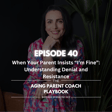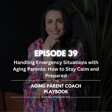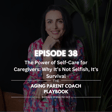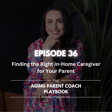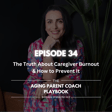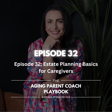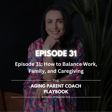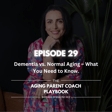Become a Creator today!Start creating today - Share your story with the world!
Start for free
00:00:00
00:00:01

Episode 10:Your Aging Parent's Hygiene and how not to Make it a Battle
In today's episode, we discuss a case where the adult child of an aging parent was struggling with their parents inconsistent hygiene habits.
Transcript
Introduction and Caregiving Challenges
00:00:43
Speaker
Hello, and welcome back to the Aging Parent Playbook. My name is Dr. Barbara Sparacino and I'm the Aging Parent Coach. Today's topic is about caregiving and navigating caregiver stress.
00:00:59
Speaker
One of the things that I have heard
Cognitive Disorders and Bathing Refusal
00:01:01
Speaker
a significant amount is about is sometimes how to help aging parents and their caregivers um navigate a bit of the I don't want to. um The I don't want to that is oh, so reminiscent of um children, right? But I don't want to, I refuse to. And that it can be a little bit more challenging when it's our parents and it's a full grown adult um with the force of all of that behind it. And um one of the one of the things that often comes to mind is bathing, right?
00:01:40
Speaker
And so one of the things that's very common in folks with cognitive disorders and dementia as it progresses is a unwillingness to maybe bathe, right? And this can be multi-factorial. There can be a lot of things going on. And you know as we age, our skin is more sensitive. um Mobility is difficult.
00:02:10
Speaker
there are many things to take
Cultural Sensitivity and Hygiene Necessity
00:02:11
Speaker
into consideration. The number one thing that I recommend is to really first think about what I want the outcome to be, right? What is the expected outcome? Is the hoped for expected outcome that my parent will bathe every day? Is the expected hoped for outcome that my parent will be clean every day, right? And those are not necessarily um
00:02:40
Speaker
the same thing. So just like in any relationship, there is give and take. And um many times it's about preconceived norms, preconceived situations, you know and it can be cultural. In some cultures, it is very important to bathe even sometimes more than once a day. right um And in other cultures, ah bathing daily is not necessarily something that is required, right, or expected. um And so there is some sensitivity that has to be taken into account when exploring this and discussing this, but, well, not but, and it is also important to understand what the cost will be to forcing something that will make our aging parent uncomfortable or distrust.
00:03:37
Speaker
So again, so my my number one thing is is what is the what do you want the outcome to be? um
Safety and Bathing Alternatives
00:03:42
Speaker
And you know sometimes it is absolutely necessary to ba to bathe or to really have a good um episode of cleaning, right? Especially if there's high risk for infection, if there is you know someone's had an accident, right?
00:04:03
Speaker
and it is in terms of being sanitary, it is very important, right? um But also like with um anyone else establishing good of routines is really important as well, right? To get someone used to maybe a different way of doing things. Now, one of the things that we speak to is when someone refuses to bathe, you know, is asking why.
00:04:31
Speaker
you know, is there something else you would rather do? Is it a different way that you would rather do it, right? um Mobility in a bathroom can be very limited. You know, this is one of the one of the things I also address is changes to homes to accommodate an aging parent um can be
00:04:53
Speaker
sometimes not that intuitive, right? We all know to put the the the bar on the wall in the shower, right? A grip bar, um one also by um maybe the commode, but there are other things too that we can do, right? ah A tub as we age is significantly hard to get in and out of because it requires balance. It requires standing down on one leg. It requires sitting sometimes. It requires getting up. so there's So baths are not necessarily in the best interest for someone who is older, right? um But even before getting there is doing spun badness ah sponge using a damp cloth, right? Making sure that um
Easing Bathing Distress with Sensory Aids
00:05:41
Speaker
the essential areas are taken care of, right? Also sometimes using a water, a hose with a handle on it
00:05:50
Speaker
There are many um things that we can adapt to really make ah bathing less distressing. right Also asking about water temperature. Again, as we age, our skin is our skin thins out and becomes more frail, more easily injured. um Also, sometimes having aromas in the bathroom may be helpful. Remember that as we age, our sense of smell diminishes as well.
00:06:18
Speaker
right So maybe having something soothing, sometimes even if someone likes music, playing music during that. um And really knowing your parent, right? Sometimes having a running conversation with them during um the bathing might be helpful. maybe It might be something that's soothing to them. Or sometimes having music, their favorite music playing in the background might be something that's distracting.
Cognitive Perception Changes
00:06:45
Speaker
um and in a good way to help them you know tolerate and navigate the what might be an unpleasant experience, right? um Also, as sometimes cognitive disorders advance, any change any change in position, any change in situation can be distressing because remember that one of the things about advancing cognitive disorders and
00:07:16
Speaker
dementia, is that there is a decrease in their ability to interpret the world. And so now the world that was once a place that they relatively trusted maybe, right that they relatively understood, that they could relatively interpret the information as much as well as any of us can, right that's coming at them right from their senses. As we age, that information is a little less clear right for anyone. right You know, as we age, it's funny and how you start turning down the volume on the car radio so you can look for a house number, right? Because you can't do two things at the same time. So it is very, so imagine if on top of that, you're losing some of your foundation, right? So any,
Establishing Routines for Harmony
00:08:06
Speaker
any sudden changes, anything that is very abrupt or brusque can be very distressing and very frightening. So I think having good,
00:08:17
Speaker
established habits, right? And that one thing that continues into another, the same way we establish habits with young children, right? That after dinner, we have bath time. And after bath time, we have bedtime, right? Or and between bath time and bedtime, we read books, have these pre-established routines. So it's so they develop almost a bit of a muscle memory to it, right?
00:08:43
Speaker
um And also not to make it a fight, not to make it something that is causes more distrust, because likely they're experiencing more distrust than you can imagine, right? Or that you're aware of, especially if this is something that is so distressing to them. um And there are alternatives, right? There are um wipes that we can use that are um
00:09:14
Speaker
to bathe, right? It doesn't necessarily have to be in a shower under running water with soap, right? There are alternatives and establishing these good communications and having good expectations for yourself of what is possible and knowing that things may decrease and deteriorate over time is also setting yourself up for success with your parent, right? Because ah what happens is that sometimes we can very frustrated with them And then we end up feeling bad about our frustration because
Encouragement and Support for Caregivers
00:09:48
Speaker
we're not frustrated with our parent. We're frustrated with the advancing disease process and how we are responding to that. So my goal is to help you have a better relationship with your aging parents and with yourself and to be able to cherish the memory of your last time with your aging parent because after
00:10:14
Speaker
they're gone, that will be what will sustain you is the memories of the times you shared with them and how you showed up for them. So let me help you show up in the best way possible. If you're interested in working with me, please go to my website, theagingparentcoach.com and schedule a free consult. And I look forward to speaking with with all of you again next week.
00:10:44
Speaker
Take care.


